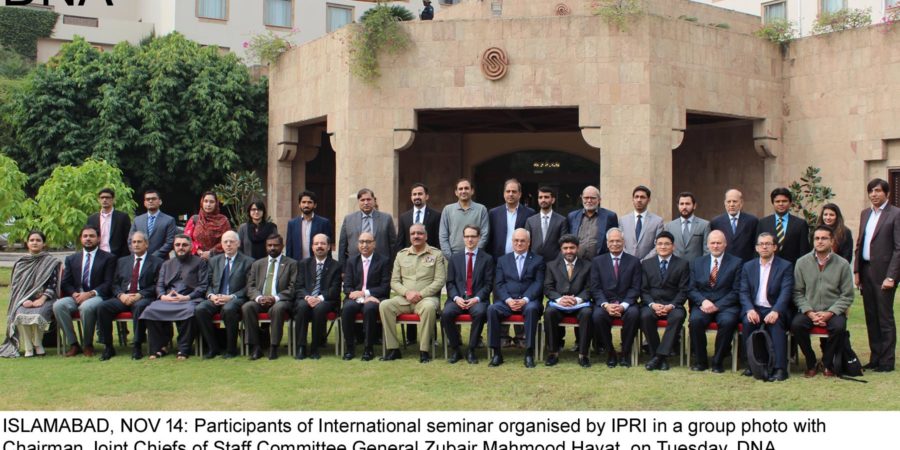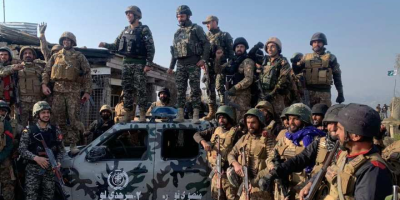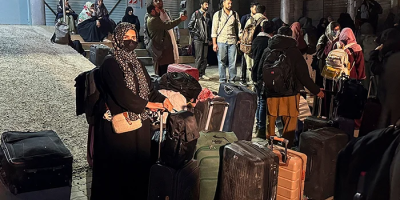Two-day international conference organised by IPRI starts

ISLAMABAD, (DNA) Asia’s resurgence is on the horizon and the world should no longer doubt the rise of the Greater Asia, which includes South Asia, China and Central Asian Republics. South Asia is the emerging centre of power in the new multi-polar world order. While peace processes may be faltering, peace dividends are huge. These were the unanimous views of the speakers at the Two-Day International Conference ‘Regional Dynamics and Strategic Concerns in South Asia’ organized by the Islamabad Policy Research Institute (IPRI) in collaboration with the Hanns Seidel Foundation (HSF), Islamabad. The upgradation of India from a “major power” to a “linchpin” of the US strategy extending from the Western Pacific and East Asia into the Indian Ocean and South Asia was also seen as problematic by many of the speakers.
In his Welcome Address, Ambassador (R) Abdul Basit, President, IPRI, shared that as one of the oldest think-tanks in Islamabad, IPRI remains committed to contributing meaningfully towards enhancing understanding of the challenges facing South Asia and exploring middle grounds for peace and prosperity. He said that Pakistan understands that unless we have normal and mutually beneficial relations with all our neighbors, the country cannot fully realize its economic potential and development agenda. ‘We are trying our best to help achieve reconciliation in Afghanistan, and are also open to a sustained and meaningful dialogue with India with a view of resolving all the bilateral issues, especially the Jammu and Kashmir Dispute’, he said.
Dr Jens Jokisch, German Charge D’Affairs in his Opening Remarks said that the conference was testimony of Pakistan and Germany’s strong commitment to promoting frank and focused discussions on topical issues. He hoped that the deliberations would ‘help put things in their correct perspectives and come up with tenable solutions to the many complex challenges which South Asia is facing.’
According to General ZubairMahmood Hayat,NI(M), Chairman Joint Chiefs of Staff Committee (CJCSC), Joint Staff Headquarters, Pakistan, ‘the road to peace in South Asia is the road through Kashmir. There is no bypass. The future prospects of global peace lie within and in Asia.’ In his Inaugural Address, he stressed that Pakistan gives preference to cooperation over conflict and confrontation, and discussed that while there has been increased emphasis on regionalism in South Asia, the region is unfortunately engulfed in inter- and intra-regional conflicts, fanned primarily by India. He highlighted the importance of understanding South Asian construct as the region’s stability is pivotal in determining global peace. ‘While Afghanistan is seen as an extension of South Asia, with constant instability in the country, Pakistan continues to bear the brunt of terrorism’, he shared, referring to the death of two soldiers at the Pak-Afghan border on 13 November. ‘Sponsoring TTP and Baloch insurgents and the capture of Indian RAW agent KulbhushanYadavfrom Balochistan is the smoking gun of India’s sinister designs being hatched in Pakistan.’ He also referred to Indian efforts of gradually manipulating and undermining the Indus Water Treaty. ‘Nonetheless, despite India’s belligerence, Pakistan has called for engagement with all regional countries as stability can be achieved through peaceful means by engaging all stakeholders’, he emphasized.
In the first session on ‘Regional Dynamics of South Asia’ Senator Mushahid Hussain Sayed, Chairman, Senate Committee on Defence, Parliamentary Committee on CPEC and Pakistan-China Institute, stressed that Pakistan has been in the eye of the storm for past several decades, whether it has been as host to the world’s largest refugee population for the longest time or as a partner in fighting the global War on Terror. ‘Pakistan has fought the longest and most successful in-land war against terrorism. It is a country with the highest soldier to officer ratio of casualties in the world’, he shared. The Senator pointed out that the people of South Asia have collectively stood against Indian hegemony in the region which it has been trying to enforce on all its smaller neighbors. ‘India has failed miserably in isolating and demonizing Pakistan in the region which is now the hub of new wave of regionalism of which CPEC is the centerpiece’, he concluded.
In his presentation on ‘Assessment of Socio-Political Trends in South Asia’ Admiral Dr. JayanathColombage, Former Chief of Sri Lankan Navy and Director, Pathfinder Foundation, Sri Lanka, described the South Asian maritime domain as a region of three ‘S’- Strategic Competition; Strategic Convergence; and Strategic Dilemma. According to the Admiral, the major conflicting situation in the region is mistrust between India and Pakistan. China’s Belt and Road Initiative and maritime infrastructure investments in the region are also seen with suspicion by other major players. Great powers rivalry between China, the US, India and Japan, has created a security dilemma in the Indian Ocean Region. ‘This competition for power and influence has put smaller less powerful states in a strategic predicament since they are compelled to choose among the major powers -some try to benefit and some hedge one against the other hampering economic progress’, he analyzed.
Looking at Pakistan and India’s SCO membership and its impact on their future relations, Dr. Boris Volkhonsky, Associate Professor, Institute of Asian and African Studies, Moscow State University, Russia, outlined that the historic decision taken at the SCO summit in Astana, Kazakhstan, in June 2017 bears significance reaching far beyond the boundaries of the 8 member states. ‘With the accession to SCO of India and Pakistan, total population of the organisation reaches 45% of the global total, with the collective GDP exceeding one third of the global one. This fact in itself makes the Organisation a game changer and an important (or, even decisive) factor in the new emerging multi-polar world order.’ He pointed out that the ‘real aims of the Global West and its vanguard, the USA, in Afghanistan is neither eradicating terrorism or drug trade, nor bringing peace and stability to the country, but rather maintaining a situation of uncertainty which would enable them to have a foothold in close vicinity to America’s biggest geopolitical rivals, that is Russia and China.’ He was of the view that the role of SCO in the future of Afghanistan rises immensely. ‘With Daesh attempting to gain foothold in the country, there is an urgent need to work out a collective approach to the issues of Afghanistan on the win-win basis with the joint participation of India and Pakistan along with all others despite all existing differences between them, ‘ he urged.
Speaking on non-traditional security challenges in South Asia, Mr. BiswasBaral, Op-Ed Editor, Republica National Daily, Kathmandu, Nepal emphasized that the time had come to mainstream climate change into the SAARC process and to work out regional and sub-regional cooperative frameworks to deal with its transnational effects. ‘SAARC efforts to tackle climate change so far have been patchy and even when there have been agreements, they have not been implemented. As climate change contributes to the fragility of nation-states, by undercutting state legitimacy, it is important that all our national and regional plans and policies incorporate climate change’, he stressed.
Mr Didier Chaudet, Editing Director, Center for the Analysis on Foreign Policy, France discussed that ‘China does not use only “classical” tools to gain geopolitical advantages, but has been a forerunner of using geo-economic policy to succeed as a great power,’ he explained. According to him, China’s geo-economics in South Asia in general, and in Afghanistan and Pakistan in particular is all about stabilizing those countries, which are neighbors, because it is in their interest as much as it is in its own interest. ‘A stable Pakistan equals a stronger ally, and a source of economic benefits over time; a stable Afghanistan means no security-related risks for Central Asia, Pakistan, and Xinjiang, territories where China has important national interests. India, on the other hand, opposes China’s geo-economics and policy in South Asia as it means the rise in influence of another power than itself.’
In his paper on ‘US-China Relations: Prospects and Challenges’, Dr. Wei Zongyou, Professor, Center for American Studies, Fudan University, China explained that with Donald Trump elected as US President and his America First foreign policy mantle, and Xi Jinping emerging from the newly-ended 19th National Congress of Communist Party of China even more powerful and vowing to rejuvenate China, Sino-US relations have entered a period of turbulence and uncertainty. He said that as no-apology preachers of China Dream and America First, both Xi and Trump vow to see their policy and agendas set in motion under their watch. How these two different visions with heavy dose of nationalist flavors can proceed smoothly against each other, especially at the backdrop of an emerging power transition, is an open question. However, for all the challenges and alarms, there’s still room for optimism of the future of China-U.S. relations. First, Xi’s China Dream does not necessarily collude with Trump’s America First. Xi’s China Dream is fundamentally based on domestic development and modernization, to make the economy more domestic driven and consumption oriented. China-U.S. economic relations is not zero-sum, but a win-win set,’ he concluded.
Discussing America’s strategic interests and priorities in South Asia, Mr. Andrew Small, Senior Transatlantic Fellow, German Marshall Fund of the United States (Asia Program), Washington DC, outlined that the US and China have a multidimensional relationship that cuts across increasingly large swathes of each other’s economic, diplomatic, and security interests. The relationship is characterized by a mix of competition and cooperation, with the balance of those elements varying by issue and region, and fluctuating according to broader trends in the bilateral relationship. ‘The two sides are deeply embedded in a global economic order that requires the free movement of commerce and capital, providing a significant shared interest in the fundamental stability of the international system, from energy supplies to global finance. However, translating these higher order interests into practical cooperation has proved difficult, given the other ideological and strategic differences between the two sides.’ According to Mr Small, China’s primary regional focus is its immediate neighborhood in East Asia, and recent years have seen intensification in the competitive elements of the U.S.-China relationship there. He pointed out that Sino-US competition is less acute in other regions, where Beijing’s military reach is more modest and its economic activities are often beneficial. South Asia largely falls under this umbrella, and, except during times of exceptional crisis, has been a second order issue in the relationship.
Professor Dr. Syed Rifaat Hussain, Head, Government & Public Policy, National University of Sciences and Technology (NUST) looked at the risks to strategic stability in South Asia. According to his analysis, offense-dominant thinking and aggressive Indian-mindset is one of the biggest threats facing the region. He pointed out that Indian commitment to pursue extremist, exclusionary Hindutva ideology poses a threat to strategic stability. ‘By propounding and practicing extremist Hindu beliefs, BJP under Modi, is cultivating a hostile Indian mindset against Muslims everywhere. This not only bodes ill for rational handling of future crises between India and Pakistan but also allows free rein to forces of death and destruction. Another source of threat in South Asia is Indian arms conventional build up along with the expansion of its nuclear and missile programme’, he warned.
While looking at Russian engagement, Dr. Shabir Ahmed Khan, Associate Professor, Area Study Center, University of Peshawar highlighted that recent deeds and agreements between Russia and Pakistan confirm that there is an obvious change in Russia’s South Asia policy in favor of Pakistan. ‘Russia recognizes Pakistan’s importance for peaceful political settlement in Afghanistan and linking Eurasian Union with South Asia, Indian Ocean and beyond. Russia has stopped viewing India as a counter weight to China in the region’, he explained. In contemporary regional geopolitical environment, Pakistan needs to take positive and correct course of action through diversification of foreign relations, importantly by having close relations with Russian Federation to enhance her bargaining power in international dealings.The session was chaired by Ambassador (R) ZamirAkram, Former Ambassador of Pakistan and Permanent Representative to the United Nations in Geneva.
The Conference concludes tomorrow with Deputy Secretary-General, Shanghai Cooperation Organization (SCO) discussing the reconciliation process in Afghanistan and the role of SCO; Dr. AttaullahWahidyar from Ministry of Education in Kabul discussing ingress of Daesh; and Dr. Christian Wagner from Germany looking at the role of global powers in building cooperative security order in South Asia.
Related News

Pakistan eliminates Mid-level TTP leaders in cross-border strikes as Operation Ghazab-lil-Haq intensifies
RAWALPINDI, MAR 5 /DNA/: Security sources on Thursday confirmed that several mid-level leaders of theRead More

Pakistanis fleeing Iran describe strikes shaking ground under their feet
ISLAMABAD, MAR 5 /DNA/: Pakistanis fleeing Iran described explosions and missile strikes across Tehran shakingRead More


Comments are Closed